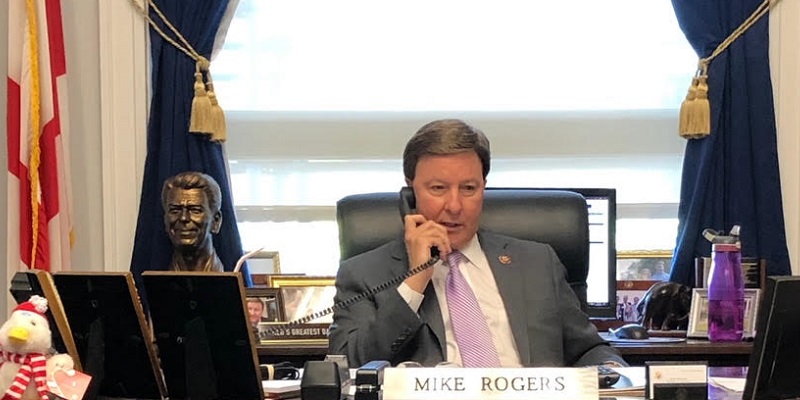On Tuesday, Rep. Mike Rogers (R-Ala.) announced during a U.S. House Rules Committee hearing that the 2025 National Defense Authorization Act (NDAA) will raise the pay of junior enlisted servicemembers by 20%.
The all-volunteer Armed Forces are struggling to meet recruiting goals. Rogers, chairman of the House Armed Services Committee, emphasized Congress’s commitment to making the armed forces more competitive with private and public sector employers.
Rogers delivered his remarks at a Rules Committee hearing in support of the Servicemember Quality of Life Improvement and National Defense Authorization Act for FY 2025.
“For the first time in decades, the year’s defense bill carries a different short title,” said Rogers. “It is the Servicemember Quality of Life Improvement and National Defense Authorization Act. We did that to underscore the tremendous gains this bill makes toward improving the quality of life for our servicemembers and their families.”
“No servicemember should have to live in squalid conditions,” said Rogers. “No military family should have to rely on food stamps to feed their children. And no one serving this country should have to wait weeks see a doctor or a mental health specialist. But that’s exactly what many of our servicemembers are experiencing, especially the junior enlisted. This bill will go a long way toward fixing that.”
RELATED: Mike Rogers: No U.S. servicemember should have to rely on food stamps
“It includes a 20 percent pay raise for the junior enlisted,” Rogers stated. “It expands allowances for housing and food and improves the cost of living calculation. The bill authorizes $766 million over the budget request to improve existing barracks and build new ones. It enables the services to pursue public private partnerships to provide better unaccompanied housing.”
“The bill reduces dangerous healthcare wait times by waiving referral requirements for specialty care and expanding the number of DoD doctors and nurses with new special recruitment and pay authorities,” Rogers continued. “The bill improves access to childcare for military families by providing over $206 million to build new DoD childcare centers and fully funding childcare fee assistance programs to offset the cost of private childcare. It also fills DoD childcare staff vacancies by making pay and benefits competitive with private industry.”
“The bill helps military spouses gain and retain employment by making it easier for them to transfer professional licenses between states,” added Rogers.
The issue of professional licenses and certifications not transferring across state lines is one that the Alabama Legislature has repeatedly addressed over the last four years.
“It also gives DoD the authority to quickly hire military spouses and keep them employed during changes in duty stations,” said Rogers. “These improvements are the result of recommendations we received from a special panel Ranking Member Smith and I set up last year to closely examine servicemember quality of life issues.”
RELATED: Alabama enacts new pro-military laws to support service members and their families
“We are making these historic improvements in the quality of life for our servicemembers because now, more than ever, we need to recruit and retain the best and the brightest,” Rogers stated. “That’s because the threats our nation faces, especially those from China, are more complex and challenging than at any point in the last 40 years. To deter these threats, the FY25 NDAA:”
- Reforms acquisition authorities and fosters private sector innovation to speed the fielding of game-changing new technologies that will give us the advantage in a conflict with China.
- Strengthens our security partnerships with Taiwan and Pacific allies.
- Fully funds the modernization of our nuclear deterrent.
- Protects U.S. military bases, the defense supply chain, and academic research from Chinese espionage.
- Builds the logistics network in the Pacific the military needs to carry out operations against China.
- And it includes new investments to retool and revitalize the industrial base to ensure it can deliver the systems we need to prevail in any conflict.
“In the face of growing threats from China, it’s also critical we restore the military’s focus on lethality,” said Rogers. “The FY25 NDAA does so by ending divisive policies that have hurt recruiting, unit cohesion, and military readiness.”
Rogers suggested that achieving these goals will rely on stewardship of existing defense spending. “We all know that deterring these threats will be an expensive endeavor. But we acknowledge there are limits on what we can spend. That’s why this NDAA is focused on rooting out waste at the DoD. If weapons systems are not responsive to the threats we face, we cut them. In fact, this bill includes over $30 billion in savings from cutting systems that can’t survive a conflict with China and by reigning in programs like the F-35 that are not delivering on requirements.”
The bipartisan NDAA passed out of Rogers’ Armed Services Committee 57 to 1. It will now move be voted on by the full U.S. House of Representatives.
To connect with the author of this story, or to comment, email [email protected]













